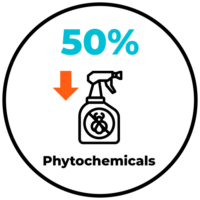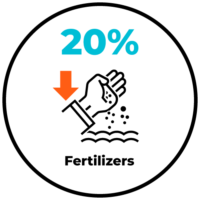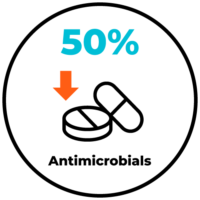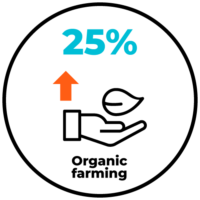Reduction by 50%
of the use
of phytochemicals
NANO.T®: Nanotechnology
at the service of agriculture
Smart, innovative, sustainable fertilizers
A new way
to feed plants
In a constantly evolving world, the ongoing population growth presents us with a demanding challenge: producing food for everybody in a sustainable way.
The development of an innovative agriculture is the only solution to satisfy our future needs. Fertilizers are a fundamental part of the supply chain and the research for new technologies to produce them forces us to find solutions in new areas of development. Nanotechnologies are the new frontier not only in medicine or industry, but, from today, also in agriculture. Thanks to the use of nanoparticles, matter between 10 and 100 nanometres, nanotechnology is highly effective in its applications because:
- It allows a targeted use of the raw material
- It allows new application methods
- It requires a moderate use of material and energy
From these premises, Nano.T® was born: a formulation based on nanoparticles which do not precipitate in the soil, thus increasing the efficiency of the nutrients necessary to the plant, without harming the environment.


A collaboration towards excellence
Quality product.
The strong interest of Cerea FCP towards innovation and the will to create more and more effective and sustainable quality products were the inputs which led to a collaboration with the University of Verona and the University of Padua. Traditional fertilizers are characterized by a limited efficiency and a leakage in the soil which has a negative impact on the environment. The necessity to address these issues led to a research and subsequent publication of a scientific paper and granting of a patent. This gave birth to Nano.T®, a line of state-of-the-art fertilizers based on nanotechnology.
“Farm to fork” strategy
The development
of an innovative agriculture
to satisfy future needs.
The new Nano.T® technology fits perfectly in the “Farm to Fork” strategy, a ten-year plan of the European Commission and integral part of the European Green Deal. The strategy involves all the operators of the food supply chain, from the producer to the consumer, and it aims to start a transition towards a fair, healthy and environmentally friendly food production system.
The main goal is to make food systems more sustainable.
The innovative technology of Nano.T®
aims to respond to the sustainable development goals set by the European Union by 2030:
Cerea FCP has embraced these objectives: our nano-fertilizers are completely biodegradable, do not leave any residue and are effective at low dosages. They thus guarantee a minor use of fertilizer without lowering the quality of production.
Nano.T® Technology
Small, mobile and effective liquid fertilizers
Nano.T® technology has been developed to produce liquid fertilizers containing nanoparticles in colloidal suspension. The processing of material having a dimension inferior to 100 nm allows to have a unique product on the market which helps to avoid deficiencies and chlorosis in a new way.
Thanks to the nanoparticles composing it, once applied, Nano.T® does not precipitate in the soil and remains available to the plants, reaching the root system through soil pores (mass flow).
Once in contact with roots, Nano.T® easily solubilizes, thus favouring its nutrients to be absorbed.
Nano-fertilizers are
Small
Nano.T® fertilizers have a dimension inferior to 100 nm
10 times smaller than a bacterium
1 metre: 1.000.000.000 nanometres (one billionth of a metre)

Mobile
Nano.T® fertilizers are in water colloidal suspension
They spread easily within the solution in the soil thanks to its porosity

Effective
Nano.T® fertilizers have a high nutrient efficiency
at low dosages
High ratio surface/volume: it increases the contact surface between the roots
and the fertilizer, helping dissolution and absorption

Traditional fertilizers vs. Nano.T®
What are the real differences between the new Nano.T® technology and traditional fertilizers?

Traditional fertilizers
- Active at limited pH ranges and employable only in some soils
- Not promptly assimilated, it requires more energy from the plant for absorption
- Reduced effectiveness if in contact with ultraviolet light, ozone, heat etc.
- Greater environmental impact: not retained by the soil, therefore subject to leaching and losses in groundwater
- Reduction of nutrient availability to the plant, in particular calcium, magnesium, and other metals
- Red-brown colouring of water

Nano.T®
- Active at 1-10 pH range and in any type of soil
- Promptly assimilated by roots
- Active in any type of temperature and light conditions
- Minor environmental impact: retained by the solid particles of the soil and not subject to leaching
- Controlled release according to plant need
- Phosphorus intake
- Not captured by filter systems of water recycling
Our products
Nano.T® line
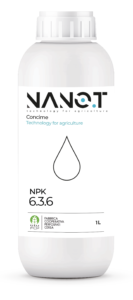
Nano.T® – NPK
NPK liquid fertilizer which provides phosphorus and iron nanoparticles (dimension <100 nm), ensuring a complete nutrition in a sustainable way. Applied in fertigation, it prevents chlorosis and improves iron absorption thanks to a controlled release.
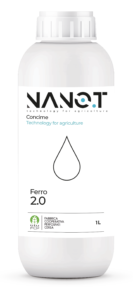
Nano.T® – Fe
Innovative liquid fertilizer based on iron nanoparticles (dimension <100 nm), which is not retained by the soil and remains available to the plant. Employed in fertigation at low dosages, it prevents damages caused by iron chlorosis.
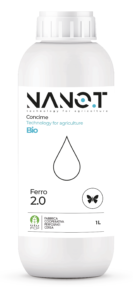
Nano.T® – Bio
Organic liquid fertilizer based on iron nanoparticles (dimension between 5 and 10 nm). Nano.t Bio is a new technology that, applied in fertigation at low dosages, guarantees an elevated effectiveness against iron chlorosis. Allowed in organic farming.
About us
FCP Cerea:
a state-of-the-art company
Cerea FCP is the only Italian cooperative of farmers for farmers, which has been producing fertilizers for more than 100 years. Thanks to the Research & Development activity, it supports farmers with a sole objective: feed the plant, respect the environment and ensure quantity, quality and healthiness of agricultural productions, always looking towards the future.
The use of renewable sources and the research for innovative fertilizers allow to move ahead every day towards a more and more integrated and advanced agriculture.




